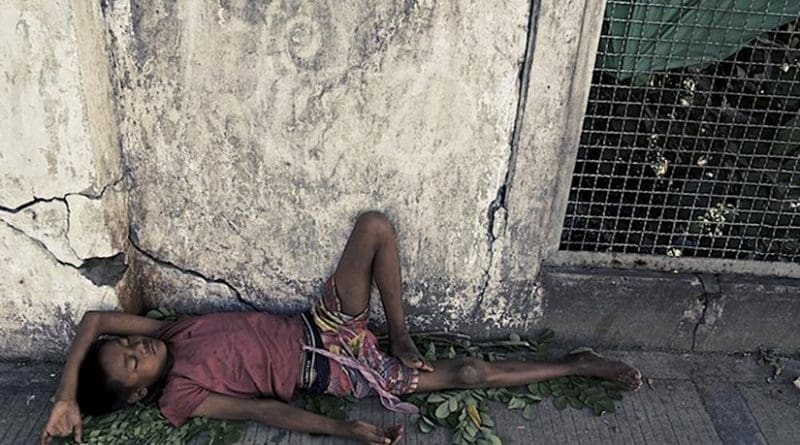India’s Rohingya Refugee Strategy – Analysis
By Observer Research Foundation
India’s decision to break with the non-refoulement principle regarding Rohingya refugees is a shortsighted strategy with wide-reaching implications.
By Terri Chapman
India has threatened to deport 40,000 Rohingya refugees, a Muslim minority group from Myanmar. This would be a mistake. Prime Minister Narendra Modi’s current visit to Myanmar is illustrative of the importance of bilateral relations for India’s economic and political agenda. India’s stance on the heightening conflict and support of Myanmar’s government is shortsighted. India’s refusal to condemn Myanmar for failing to adequately address concerns of human rights violations and the massive outflows of people from its Western state of Rakhine may make negotiations over the next two days easier, but will do nothing to address the long-standing conflict, which will have long-term impacts on India’s economic interests.
More than 100,000 Rohingya have fled Myanmar in recent weeks due to increasing persecution and violence. The Rohingya population of Myanmar has faced persistent discrimination by state officials and security forces, including ongoing restrictions on movement and the denial of education, healthcare, political rights, documentation and citizenship. Since militant attacks in October 2016, there have been multiple reports of military crackdowns against Rohingya civilians, including arson attacks, extrajudicial killings and systematic rape. Further militant attacks were carried out on 25 August by the Arakan Rohingya Salvation Army (ARSA). This has been met by excessive military action, prompting mass emigration of Rohingya civilians who have fled to nearby Bangladesh and India.
India, as an emerging global and regional power should recognise and abide by the principal of non-refoulement, which prevents any state, regardless of its signatory status, from deporting refugees by any means to countries where they face reasonable fear of persecution. India’s respect of non-refoulement is not only necessary in order to protect the lives of these refugees, but also to affirm India’s regard for international obligations and law, and to ensure the possibility of security and peace in India’s strategic neighbouring state.
India is intimately aware of the oppression faced by Rohingyas in Myanmar. Deporting Rohingyas from India is not a tenable option, both Myanmar and Bangladesh have refused to accept them. The plan to deport these refugees has been described as impossible logistically and legally and has been widely condemned. A more realistic strategy for addressing this pressing issue should be articulated.
India’s announcement will likely dampen the world’s image of India as a legitimate global power given its blatant disregard for international practice and law. While India is among the minority of countries that is not party to the 1951 Convention or the 1967 Protocol relating to the status of refugees, India is still bound by international customary law. This requires preventing the deportation of refugees regardless of their legal right to be in the host country as well as the establishment of efficient and fair refugee status determination procedures. India should respect these customary laws as they are widely recognised as legally binding, not least by the 145 signatory countries. India has acceded to other human rights treaties with provisions for the rights of refugees, including the principal of non-refoulement. India’s disregard for these obligations and legal frameworks will raise valid questions about India’s role in global politics.
The Union Minister of State for Home Affairs, Kiren Rijiju, reportedly conflated Rohingya refugees with illegal immigrants. His statements are seen as contradictory to India’s generally liberal stance towards refugees. The unprecedented call for states to identify and deport refugees has fueled further violence against Rohingya communities in India.
To rectify this, India should respect its obligations by recognising the refugee status of the 16,500 Rohingyas that have already received refugee status from UNHCR in India, as well as by allowing the continued determination of status for all individuals seeking asylum by permitting them to remain in India without threat of deportation. As an emerging power, India could play a profound role in shaping and upholding international practices and laws. Deporting 40,000 refugees to a country where they face summary executions, enforced disappearances, arbitrary arrest and detention, torture and ill-treatment, and forced labor does not send the message to the international community that India is prepared to play a meaningful role in establishing and maintaining international order.
The shortsighted support of Myanmar’s government by India will make no progress towards securing peace and stability. India reaffirmed its stance towards Rohingya refugees through its threat of deportation. A more calculated long-term strategy for engaging with Myanmar is needed. India should encourage Myanmar’s government to resolve its ongoing internal conflict. Without significant changes to Myanmar’s discriminatory policies and practices conflict and violence is unlikely to abate.
Maintaining peace and stability in Myanmar is in India’s economic interest as the country has been defined as a “key pillar” in its Act East Policy. The plan seeks to promote economic cooperation, cultural ties and to develop strategic relationships with countries in the Asia Pacific region. One project under this initiative is the India-Myanmar Kaladan Multimodal Transportation Project meant to improve connectivity to Southeast Asia.
Competition from China is another factor shaping India’s interest in Myanmar. China has made significant inroads with Myanmar in recent years and is pursuing large investment projects in line with the One Belt One Road Initiative. India is seeking to catch up, but without real stability in Myanmar and an end to ongoing persecution and violence, India’s economic and strategic initiatives in Myanmar will be unrealistic and unsustainable. India should pursue a long-term strategy to secure its bilateral relationship with Myanmar.
Adhering to non-refoulement would provide protection to individuals who desperately need it. It would also allow India to assert its willingness to abide by international norms and law, better position India in the global and regional context. Further, India should build bilateral relations with Myanmar that will secure long-term economic and political interests, rather than one that will boost its short-term agenda.


Totally agree. The Modi government lacks a moral core. It is all short term self interest.